WASHINGTON -- If it weren't for bad luck, Mike Huckabee would have no luck at all. Of all the deranged criminals in the country, Maurice Clemmons -- granted clemency by then-Gov. Huckabee of Arkansas almost a decade ago -- recently murdered four police officers in Washington state. Seldom has an act of mercy been more publicly or horribly betrayed.
Some of Huckabee's potential rivals for the 2012 Republican nomination responded, not merely by criticizing this specific act of clemency but by rejecting the very idea. "In Minnesota," said Gov. Tim Pawlenty, "I don't think I've ever voted for clemency." "My conclusion," argues former Massachusetts Gov. Mitt Romney, "was if somebody has been convicted by a jury of their peers and they have been prosecuted and the police were able to get the evidence necessary to put them behind bars, why in the world would I step in and reverse that sentence?"

Given the viciousness of Clemmons' crime, this reaction is predictable. But there is a serious argument for clemency that reaches back to the Founders. In Federalist 74, Alexander Hamilton writes: "Humanity and good policy conspire to dictate, that the benign prerogative of pardoning should be as little as possible fettered or embarrassed. The criminal code of every country partakes so much of necessary severity, that without an easy access to exceptions in favor of unfortunate guilt, justice would wear a countenance too sanguinary and cruel."
Hamilton contended that strict laws, while necessary, must occasionally be set aside for humanitarian reasons that the "rigor of the law" does not foresee -- a view embodied in the U.S. Constitution and most state constitutions. In Hamilton's time -- with a variety of petty crimes punishable by death -- mercy by the executive was an essential part of a working legal order. Our system -- with the growth of mandatory minimum sentences and three-strikes laws -- is not so different, except in severity. It has become easy for nonviolent drug offenders, or troubled teens, to stumble into long prison sentences that effectively end their lives.
Recommended
This was precisely the case with Clemmons. At age 16, he committed a string of robberies and burglaries. He was sentenced to 108 years in prison without possibility of parole -- a disproportionate punishment by any measure. Eventually, a judge recommended that his sentence be modified. The state parole board agreed. The sentencing judge did not object. Huckabee commuted Clemmons' sentence from 108 years to 47 years, making him eligible for parole. It was the parole board that set Clemmons free, after he had served 11 years in prison.
This second chance offered to Clemmons was rejected. Soon he was back in prison on robbery charges. Because of prosecutorial incompetence -- a warrant served years too late -- Clemmons was free to move to Washington state. There he entered a descending spiral of crime and mental illness -- threatening policemen and sexually assaulting young relatives while claiming to be the Messiah -- that ended in murder. Authorities had chance after chance to put Clemmons away. Their failure caused suffering. But it is unfair to place the responsibility for that failure on an act of clemency a decade earlier.
Huckabee's critics counter that the Clemmons case was part of a promiscuous pattern of clemency. During a decade as governor of Arkansas, Huckabee commuted 163 sentences, a pace greater than that of most governors. Some of Huckabee's commutations turned out to be wise. This one had a terrible human cost. In hindsight, the families of the dead have every right to their anger.
But decisions of this type are not made in hindsight. It is not easy to discern if a young burglar, given another chance, will become a model citizen or a psychotic killer. Yet governors, parole boards and prosecutors are forced to make such impossible judgments regularly when considering clemency, parole and plea bargains. It would be simple always to err on the side of harshness, endlessly filling prisons to minimize risk. But harshness without discretion is not practical, and, in Hamilton's view, not just. Is there really no circumstance in which the strictest application of the law is "too sanguinary and cruel"?
Some professions involve decisions about life and death. When treatment by a doctor results in death and suffering -- as treatments sometimes do -- we ask if his initial choices were reasonable or negligent. The standard applied to governors making clemency decisions should be the same. Huckabee's choice allowed a tragedy. But that does not make it unreasonable.

























Join the conversation as a VIP Member